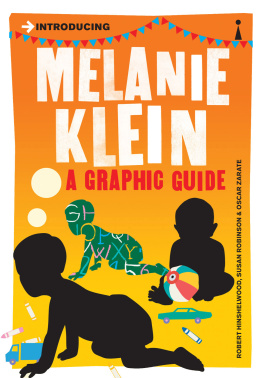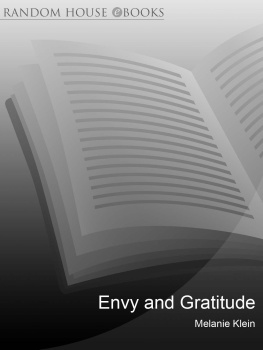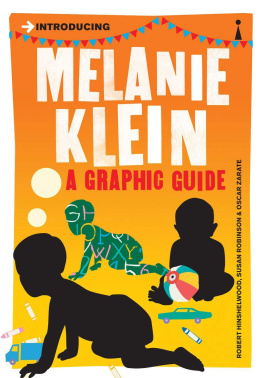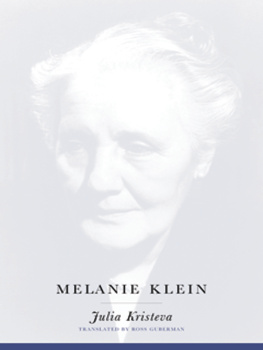Melanie Klein - Envy and Gratitude and Other Works
Here you can read online Melanie Klein - Envy and Gratitude and Other Works full text of the book (entire story) in english for free. Download pdf and epub, get meaning, cover and reviews about this ebook. year: 0, genre: Science. Description of the work, (preface) as well as reviews are available. Best literature library LitArk.com created for fans of good reading and offers a wide selection of genres:
Romance novel
Science fiction
Adventure
Detective
Science
History
Home and family
Prose
Art
Politics
Computer
Non-fiction
Religion
Business
Children
Humor
Choose a favorite category and find really read worthwhile books. Enjoy immersion in the world of imagination, feel the emotions of the characters or learn something new for yourself, make an fascinating discovery.
- Book:Envy and Gratitude and Other Works
- Author:
- Genre:
- Year:0
- Rating:3 / 5
- Favourites:Add to favourites
- Your mark:
- 60
- 1
- 2
- 3
- 4
- 5
Envy and Gratitude and Other Works: summary, description and annotation
We offer to read an annotation, description, summary or preface (depends on what the author of the book "Envy and Gratitude and Other Works" wrote himself). If you haven't found the necessary information about the book — write in the comments, we will try to find it.
Envy and Gratitude and Other Works — read online for free the complete book (whole text) full work
Below is the text of the book, divided by pages. System saving the place of the last page read, allows you to conveniently read the book "Envy and Gratitude and Other Works" online for free, without having to search again every time where you left off. Put a bookmark, and you can go to the page where you finished reading at any time.
Font size:
Interval:
Bookmark:


Display Reference Line
(1975). The International PsychoAnalytical Library, 104:1-346
Envy and Gratitude and Other Works 19461963
Edited By: M. Masud R. Khan
R. E. Money-Kyrle
This third volume of The Writings of Melanie Klein contains all her later work from 1946 until her death in 1960with the exception of Narrative of a Child Analysis which is published separately as Volume IV. Unlike the papers which compose Volume I, Love, Guilt and Reparation 192145 (most of which were originally published in Contributions to Psycho-Analysis) the contents of Volume III have never before been collected together. Some of them appeared first in two books, Developments in Psycho-Analysis and New Directions in Psycho-Analysis, which also included contributions by authors other than Melanie Klein. Envy and Gratitude was originally a monograph, and some of the papers were published posthumously in Our Adult World and Other Essays. Moreover, written as they were some specifically for psychoanalysts and some for the general reader, they are less homogeneous than are the contents of the other volumes. But they contain writings of the latter and most mature phase of Melanie Klein's working life and so include works which for the Kleinian student are of the very first importance.
As in the case of Volumes I and II there are Explanatory Notes towards the end of the book designed to indicate the position of each main theme in the evolution of Melanie Klein's thought. At the end, one Introduction and two Prefaces written by Ernest Jones for earlier editions are preserved for their historical interest.
- vii
Money-Kyrle, R. E. (1975). The International PsychoAnalytical Library 104
1 Notes on Some Schizoid Mechanisms (1946)
The present paper is concerned with the importance of early paranoid and schizoid anxieties and mechanisms. I have given much thought to this subject for a number of years, even before clarifying my views on the depressive processes in infancy. In the course of working out my concept of the infantile depressive position, however, the problems of the phase preceding it again forced themselves on my attention. I now wish to formulate some hypotheses at which I have arrived regarding the earlier anxieties and mechanisms. 2
The hypotheses I shall put forward, which relate to very early stages of development, are derived by inference from material gained in the analyses of adults and children, and some of these hypotheses seem to tally with observations familiar in psychiatric work. To substantiate my contentions would require an accumulation of detailed case material for which there is no room in the framework of this paper, and I hope in further contributions to fill this gap.
At the outset it will be useful to summarize briefly the conclusions regarding the earliest phases of development which I have already put forward. 3
In early infancy anxieties characteristic of psychosis arise which drive the ego to develop specific defence-mechanisms. In this period the fixation-points for all psychotic disorders are to be found. This hypothesis led some people to believe that I regarded all infants as psychotic; but I have already dealt sufficiently with this misunderstanding on other occasions. The psychotic anxieties, mechanisms
1 [footnote to 1952 version:] This paper was read before the British PsychoAnalytical Society on December 4, 1946, and has been left unchanged and then published, apart from a few slight alterations (in particular the addition of one paragraph and some footnotes).
2 Before completing this paper I discussed its main aspects with Paula Heimann and am much indebted to her for stimulating suggestions in working out and formulating a number of the concepts presented here.
3 Cf. my Psycho-Analysis of Children(1932), and A Contribution to the Psychogenesis of Manic-Depressive States (1935).
- 1
and ego-defences of infancy have a profound influence on development in all its aspects, including the development of the ego, superego and object-relations.
I have often expressed my view that object-relations exist from the beginning of life, the first object being the mother's breast which to the child becomes split into a good (gratifying) and bad (frustrating) breast; this splitting results in a severance of love and hate. I have further suggested that the relation to the first object implies its introjection and projection, and thus from the beginning object-relations are moulded by an interaction between introjection and projection, between internal and external objects and situations. These processes participate in the building up of the ego and superego and prepare the ground for the onset of the Oedipus complex in the second half of the first year.
From the beginning the destructive impulse is turned against the object and is first expressed in phantasied oral-sadistic attacks on the mother's breast, which soon develop into onslaughts on her body by all sadistic means. The persecutory fears arising from the infant's oral-sadistic impulses to rob the mother's body of its good contents, and from the analsadistic impulses to put his excrements into her (including the desire to enter her body in order to control her from within) are of great importance for the development of paranoia and schizophrenia.
I enumerated various typical defences of the early ego, such as the mechanisms of splitting the object and the impulses, idealization, denial of inner and outer reality and the stifling of emotions. I also mentioned various anxiety-contents, including the fear of being poisoned and devoured. Most of these phenomenaprevalent in the first few months of lifeare found in the later symptomatic picture of schizophrenia.
This early period (first described as the persecutory phase) I later termed paranoid position, 1 and held that it precedes the depressive position. If persecutory fears are very strong, and for this reason (among others) the infant cannot work through the paranoidschizoid position, the working through of the depressive position is in turn impeded. This failure may lead to a regressive reinforcing of persecutory fears and strengthen the fixation-points for severe psychoses (that is to say, the group of schizophrenias). Another outcome of serious difficulties arising during the period of the
1 When this paper was first published in 1946, I was using my term paranoid position synonymously with W. R. D. Fairbairn's schizoid position. On further deliberation I decided to combine Fairbairn's term with mine and throughout the present book [ Developments in Psycho-Analysis, 1952, in which this paper was first published] I am using the expression paranoidschizoid position.
- 2
depressive position may be manic-depressive disorders in later life. I also concluded that in less severe disturbances of development the same factors strongly influence the choice of neurosis.
While I assumed that the outcome of the depressive position depends on the working through of the preceding phase, I nevertheless attributed to the depressive position a central role in the child's early development. For with the introjection of the object as a whole the infant's object-relation alters fundamentally. The synthesis between the loved and hated aspects of the complete object gives rise to feelings of mourning and guilt which imply vital advances in the infant's emotional and intellectual life. This is also a crucial juncture for the choice of neurosis or psychosis. To all these conclusions I still adhere.
Next pageFont size:
Interval:
Bookmark:
Similar books «Envy and Gratitude and Other Works»
Look at similar books to Envy and Gratitude and Other Works. We have selected literature similar in name and meaning in the hope of providing readers with more options to find new, interesting, not yet read works.
Discussion, reviews of the book Envy and Gratitude and Other Works and just readers' own opinions. Leave your comments, write what you think about the work, its meaning or the main characters. Specify what exactly you liked and what you didn't like, and why you think so.













